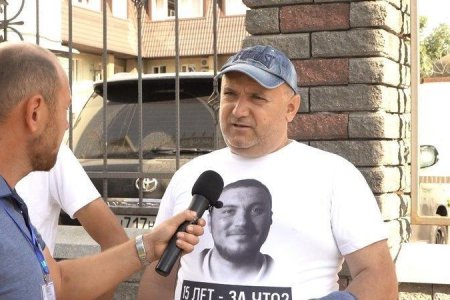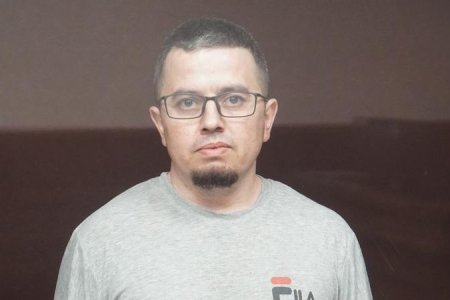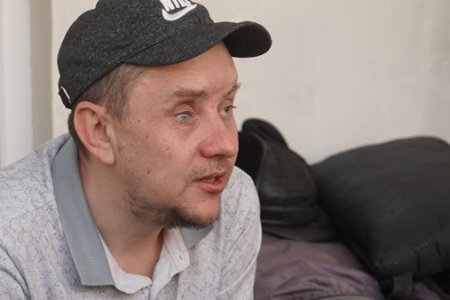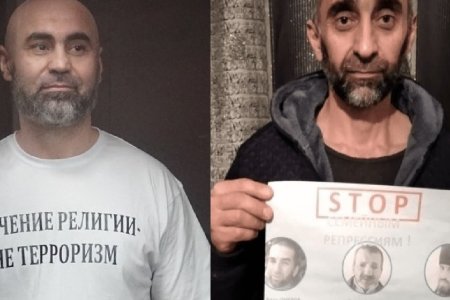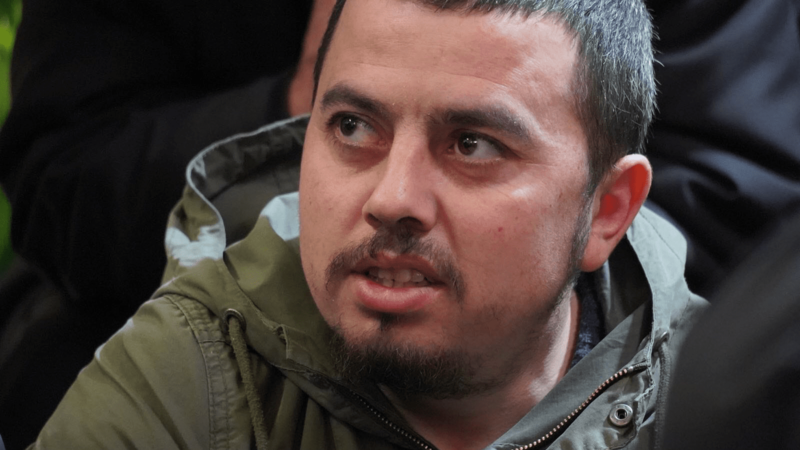
Russia’s FSB has again taken an elderly mother’s two sons from her for the sake of fabricated statistics on prosecutions in occupied Crimea. Three years after Enver Seitosmanov (b. 1986) received a 17-year sentence without any crime, a Russian court has sentenced his brother Ernes Seitosmanov (b. 1985) to 18 years on identical and profoundly flawed charges.
The cynicism behind this ‘trial’ and horrific sentence is especially shocking given that the FSB first carried out an armed search of the brothers’ home near Sevastopol over eight years ago, in January 2015. On that occasion it was Ernes Seitosmanov who was their target, yet no arrest was made. It seems likely that Russia was still testing international reaction to its illegal imposition of Russian legislation in occupied Crimea and decided that the four men arrested in January or (in one case) in April 2015 on nonsensical ‘terrorism’ charges would do for the pilot prosecution. Had Ernes Seitosmanov and his brother been arrested then, the same ‘guilty’ verdicts would have been guaranteed, but the sentences shorter. Not one of Russia’s conveyor-belt ‘trials’ and sentences of Crimean Tatars or other Ukrainian Muslims is in response to real crimes, alleged to have been committed by one or other individual. All are based solely on a flawed, secret and probably politically motivated Russian Supreme Court ruling on 14 February 2003. That ruling, which was only made public when it could no longer be formally challenged, declared the peaceful transnational Muslim organization Hizb ut-Tahrir ‘terrorist’. No adequate explanation was provided for thus outlawing an organization which is perfectly legal in Ukraine, and which is not known to have committed any act of terrorism anywhere in the world.
The Russian FSB carried out four armed searches of Ernes Seitosmanov’s home in total. After that first occasion in January 2015, when Ernes was the target, but nobody was arrested, they came again on 10 May 2018, and took both brothers, and their elderly mother away, before eventually charging only Enver Seitosmanov with the more serious of the two ‘terrorism’ charges, namely of ‘organizing a supposed Hizb ut-Tahrir group’, under Article 205.5 § 1 of Russia’s criminal code. By 2018, Russia had begun using ‘Hizb ut-Tahrir charges’ as a weapon against Crimean Tatar civic journalists and activists; and had also begun almost automatically adding a second charge, under Article 278, of ‘planning to violently overthrow the Russian constitutional order’. The second charge is based on the same fictitious ‘evidence’ as the first but justifies the imposition of even longer sentences. Enver Seitosmanov was ‘sentenced on 5 December 2019 by a panel of ‘judges’ at the Southern District Military Court to 17 years in a harsh-regime prison colony. That sentence, based solely on innocuous conversations, and on the ‘testimony’ of so-called secret (anonymous) witnesses, was upheld on 16 April 2020.
Ernes Seitosmanov reacted to the mounting repression against Crimean Tatars under Russian occupation by attending political trials, either in occupied Crimea, or at the Southern District Military Court in Rostov. He also helped the families of political prisoners, and took part in flash mobs or other civic initiatives in solidarity with victims of persecution. He was one of very many men and women detained on 23 November 2021 and jailed for up to two weeks merely for trying to welcome lawyer Edem Semedlyaev who was due to be released after 12 days in prison for doing his job.
Ernes had been subjected to a third, very ominous, raid on 28 April 2021 He was taken away by the FSB, and only released late in the evening, after being forced to sign an undertaking not to reveal what the interrogation, carried out without a lawyer, was about.
The FSB came for Ernes at 4 a.m. on 9 February 2022. In the absence of lawyers who are always illegally prevented from being present, they claimed to have ‘found’ two books of ‘prohibited literature’. They made no pretence of looking for any weapons or other evidence of criminal intent, although Ernes was charged with the more serious ‘‘organizing a Hizb ut-Tahrir group’ charge under Article 205.5 § 1 and with ‘planning to violently overthrow the constitutional order’ (Article 278).
Four civic activists were arrested that same day, including Ansar Osmanov (b. 1975). It later became clear that the charges against both Ernes Seitosmanov and Osmanov were based on an illicitly taped conversation between them at the home Ernes shared with his elderly mother. In it, the men spoke on religious subjects, as well as about Russian repression.
The conversation was, as always, passed to FSB-loyal ‘experts’ employed to claim there to be ‘evidence’ of Hizb ut-Tahrir involvement or ‘conspiratorial’ intent in this or that word or phrase. Important to note that the defence obtained an independent linguistic analysis of the so-called ‘expert’ assessment. This was carried out by Yelena Novozhilova, a qualified court expert. She was adamant that there were no signs of any calls to violence or to terrorist activities in the tape.
The independent expert was, predictably, ignored by the court, which also allowed secret witnesses, despite the lack of any evidence that these would be endangered by testifying in public. Essentially all of these massive sentences are based on the ‘testimony’ of individuals who may have never met the men and who can repeat the indictment almost verbatim, while being unable to answer very basic questions about the defendant or their alleged meetings. The ‘judges’ at the Southern District Military Court invariably allow such secrecy, and essentially work for the prosecution by blocking questions which demonstrate that the secret witnesses are lying.
Worth noting that Ernes Seitosmanov and Ansar Osmanov were tried separately which would make no sense had their conversation genuinely proven any involvement, together, in Hizb ut-Tahrir.
On 12 April, Russian prosecutor Viacheslav Kuznetsov claimed the charges against Ernes to be justified and demanded an 18-year sentence. On 24 Mayv2023, ignoring all of the gross flaws in the prosecution’s case and lack of any grounds for the charges, ‘judges’ Vitaly Mamedov (presiding), Maksym Nikitin and Magomedbasir Shuaipov from the Southern District Military Court obliged. The only difference was that the first four (and not five, as Kuznetsov demanded) years of the 18-year sentence are to be sent in a prison, the absolute worst of all Russian penal institutions, with the rest of the sentence in a harsh-regime prison colony. This is at least twice as long as sentences passed by Russian courts against murderers. Unlike in such political cases, the latter can, in addition, hope for early release (not to mention a full pardon if they agree to go and fight Russia’s war against Ukraine.)
Lawyer Alexei Ladin had demanded full acquittal and will be appealing against the sentence.
During his final address to the court, Ernes stated the following:
“Terrorism is a particularly serious charge. In Islam it is a crime that is categorically condemned. As a Muslim, I am categorically against terrorism, and I regard the charge against me to be slanderous. As for the definition of the word ‘terrorism’ – this is intimidation. If you look at the case against me, there was not a single occasion when I intimidated anybody, or when I caused any harm to society or to individiauls.
In essence, the intimidation was against me. They came at 3 a.m. to the home I share with my elderly mother who was absolutely terrified. We can speak of a huge number of such cases, of mass instances of intimidation. I link that with terror. I was detained, brought here and placed in detention, with this a crime directed against me.”
It should be stressed that this assessment of Russia’s fake ‘terrorism’ charges against civic activists like Ernes Seitosmanov is fully shared by Ukrainian, Russian and international human rights organization, by European and international bodies, such as the UN General Assembly and OSCE, as well as by all democratic states.
Please help circulate information about Ernes and Enver Seitosmanov! It is only Moscow that wins when we allow such horrific sentences against innocent men to be passed without adequate protest.
Please also write to Ernes and Enver! The letters send an important message both to them and to Moscow. Letters need to be on ‘safe’ subjects and in Russian. If that is a problem, the letter below (copied by hand) would be fine.
Sample letter
Здравствуйте,
Желаю Вам здоровья, мужества и терпения, надеюсь на скорое освобождение. Простите, что мало пишу – мне трудно писать по-русски, но мы все о Вас помним.
[Hi. I wish you good health, courage and patience and hope that you will soon be released. I’m sorry that this letter is short – it’s hard for me to write in Russian., but you are not forgotten. ]
Addresses
Ernes Seitosmanov
344022, Россия,, Ростовская обл., г. Ростов-на-Дону, ул. Максима Горького, 219, ФКУ СИЗО-1
Сейтосманову, Эрнесту Кязимовичуу, г.р. 1985
[Or in English
344022 Russian Federation, Rostov on the Don, 219 Maxim Gorky St, SIZO-1
Seitosmanov, Ernes Kiazimovych, b. 1985).
Enver Seitosmanov!
453256, Россия, Республика Башкортостан, г. Салават, ИК-16
Сейтосманову, Энверу Кязимовичу, 1986 г.р.
[In English: Russian Federation, 453256, Bashkortostan, Salavat, Prison No. 16
Seitosmanov, Enver Kyazimovich, b. 10.11.1986
, Ansar Ismailovych, b. 1975]
